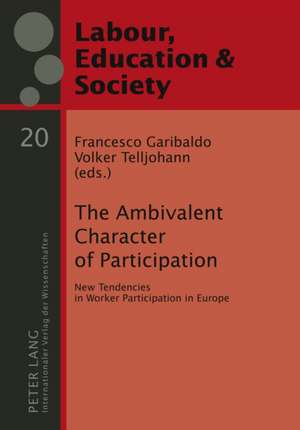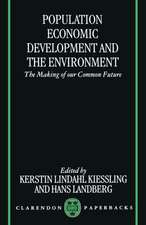The Ambivalent Character of Participation: Arbeit, Bildung & Gesellschaft / Labour, Education & Society, cartea 20
en Limba Engleză Hardback
Preț: 778.00 lei
Preț vechi: 854.94 lei
-9% Nou
Puncte Express: 1167
Preț estimativ în valută:
148.94€ • 153.17$ • 123.56£
148.94€ • 153.17$ • 123.56£
Tipărit la comandă
Livrare economică 17-22 februarie
Preluare comenzi: 021 569.72.76
Specificații
ISBN-13: 9783631589434
ISBN-10: 3631589433
Pagini: 716
Dimensiuni: 298 x 156 x 46 mm
Greutate: 0 kg
Editura: Peter Lang Gmbh, Internationaler Verlag Der W
Seria Arbeit, Bildung & Gesellschaft / Labour, Education & Society
ISBN-10: 3631589433
Pagini: 716
Dimensiuni: 298 x 156 x 46 mm
Greutate: 0 kg
Editura: Peter Lang Gmbh, Internationaler Verlag Der W
Seria Arbeit, Bildung & Gesellschaft / Labour, Education & Society
Cuprins
Contents: Francesco Garibaldo: Introduction - Erik Poutsma/Ulke Veersma: Direct and indirect participation: reconcilable voices? Report from Stream I - Szilvia Borbély: The role of the institutional context for participation and interest representation in Hungary and beyond - Maria Matey-Tyrowicz: Informing and consulting employees in Poland - Problems of implementation of Directive 2002/14/EC - Ekaterina Ribarova: The institutional context of workers participation in Bulgaria - which way after joining the EU - Nick Kratzer/Wolfgang Dunkel/Wolfgang Menz: Employee participation in new forms of organization and control opportunity for company health policies or potential for new burdens? - Sonia McKay: The role of trade union representatives in the conduct of workplace relations - Volker Telljohann: Work organisation, workers' participation and the role of EU legislation in Italy - Jochen Tholen: Managers and management: The impact of Western Foreign Direct Investment in the new EU Member States - María C. Gonzalez: The role of Industrial Relations and HRM in direct participation practice in Spain - Mirella Baglioni: New forms of interest organisation: the state of the art - Guglielmo Meardi: Lights and shadows of employee participation in the new EU member states - Anna Pollert: The non-unionised worker and workplace problems: Forms of individual and collective voice at work - Salvo Leonardi: Union organisation of employees in atypical and precarious work in Italy - Alan Tuckman/Michael Whittall: Giving employees a voice? Lessons from the new employee forums in the UK - Paul Oehlke: Strategies of improving organizational performance through workplace participation - Report from Stream II - Elise Ramstad: Role of workplace practices and supporting development process and institutional condition in the promotion of performance and quality of working life - Jan Kees Looise/Nicole Torka/Jan Ekke Wigboldus: Participation and organizational performance - Norbert Kluge/Sigurt Vitols/Peter Wilke: Good corporate governance and the function of obligatory employees' involvement: the concept of a sustainable company - Patricia Nieto Rojas: Employee financial participation in Spain - Wilfried Kruse: Workplace quality as a «contested ground»: comments on the ambivalence of workplace participation today - Davide Antonioli/Massimiliano Mazzanti/Paolo Pini: Innovation, industrial relations and working conditions - evidence from two Italian local production systems - Loris Lugli/Stefano Tugnoli/Ires Emilia-Romagna: Innovation and work quality. A field research - Karina Becker/Ulrich Brinkmann/Thomas Engel: «Hybrid Participation» - the missing link? The role of expert employees and support groups for the works councils in Germany - Ralf Niemann: Direct participation as a way to safeguard a plant? The example of a German steel company - Tuomo Alasoini: Workplace innovation and development in Finland: Examining the workplace development programme TYKES - Paul Berckmans: «Quality of Working Life» on the agenda of Flemish regional policy - Romain Chevallet: Employee participation in ninety-five investment projects - Experience and action priorities for public policies based on observations of SME practices - Friedhelm Keuken: Improvement of the performance of SMEs and their employees by participation of employees in the Region North Rhine-Westphalia, Germany - Basic ideas, project examples, support structures and results - Ulrich Klotz: Making better use of potential to innovate! - some food for thought in the «Year of Innovation» - Valeria Pulignano: Employee participation in Europe: Propositions for designing a new
Notă biografică
Francesco Garibaldo is an industrial sociologist and former director of the Institute for Labour in Bologna (Italy). He worked for several years for trade unions and is vice-president of the Research Committee on Participation, Organizational Democracy and Self-Management RC10 of the International Sociological Association.
Volker Telljohann is senior researcher at the Institute for Economic and Social Research of Emilia-Romagna (IRES ER). He is an industrial sociologist and secretary general of the international network Regional and Local Development of Work and Labour (RLDWL).
Volker Telljohann is senior researcher at the Institute for Economic and Social Research of Emilia-Romagna (IRES ER). He is an industrial sociologist and secretary general of the international network Regional and Local Development of Work and Labour (RLDWL).





























